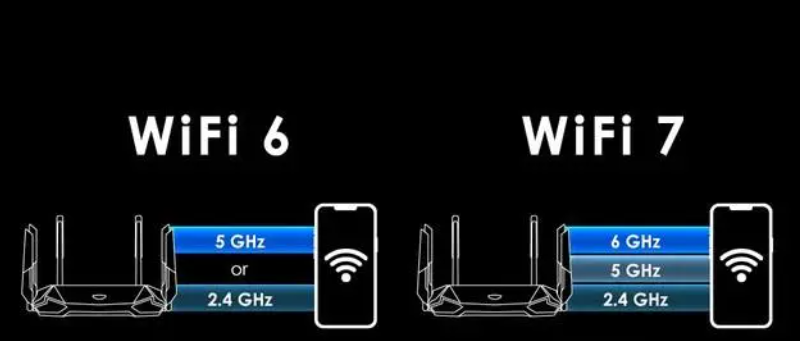IPQ8072 VS IPQ9274 chip-What progress has WiFi 7 made compared to WiFi 6?

IPQ8072 VS IPQ9274 chip-What progress has WiFi 7 made compared to WiFi 6?
WiFi 7 has become one of the hottest topics, especially after Qualcomm, H3C and other manufacturers released WiFi 7 commercial solutions, the discussion about WiFi 7 exploded again. So, what are the significant improvements of WiFi 7 compared to WiFi 6? For ordinary home users, do they need to upgrade to WiFi 7 now?
First of all, the wireless transmission rate of WiFi 7 has been greatly improved, jumping from 9.6Gbps of WiFi 6 to 30Gbps. This is mainly due to the expansion of frequency bands and wireless channels, as well as the upgrade of modulation methods.
On the basis of 2.4GHz and 5GHz, WiFi 7 incorporates the 6GHz frequency band dedicated to WiFi 6E into the regular frequency band. From the perspective of wireless channels, WiFi 7 uses a 320MHz channel, which is double the 160MHz of WiFi 6. In terms of modulation, WiFi 7 uses 4096-QAM, while WiFi 6 is 1024-QAM.
However, according to user feedback, the user experience improvement of WiFi 6 is not obvious compared with WiFi 5, and the network speed is not up to the advertised data. Then WiFi 7 means little to ordinary home users. It is mainly for high-speed intranet transmission and AR/VR scenarios. For users with NAS, it will be faster to access stored data through WiFi 7. For AR/VR devices, lower latency and richer data experience can be obtained.
Here are some of the technical improvements in WiFi 7:
Higher data transfer rates: WiFi 7 is likely to introduce higher data transfer rates, allowing it to provide faster wireless connections across a wider spectrum. This may include a higher maximum data transfer rate, providing faster download and upload speeds.
Wider spectrum: WiFi 7 is expected to support a wider range of spectrum, which will provide more space for more devices, alleviating network congestion issues while providing more stable connections.
Lower latency: WiFi 7 may introduce new technologies that reduce network latency, resulting in more real-time and responsive connections. This is very important for online gaming, video conferencing and other applications that require instant communication.
More MIMO streams: Multiple-input multiple-output (MIMO) technology may be further developed to provide more MIMO streams, allowing devices to transmit data between more antennas, thereby improving network performance.
Stronger security: WiFi 7 may introduce more advanced security features to protect users' data and privacy and prevent cyberattacks and intrusions.
Better multi-user performance: WiFi 7 may improve multi-user multiple-input multiple-output (MU-MIMO) technology to provide more efficient multi-user performance, which will provide a better experience when connecting multiple devices at the same time.
Better energy efficiency: WiFi 7 is likely to optimize energy consumption, improve device energy efficiency, and extend battery life, especially for IoT devices and mobile devices.
Better positioning technology: WiFi 7 may introduce more advanced positioning technology to make positioning more accurate, which is very important for indoor navigation and location services.
Intelligent connection management: WiFi 7 may introduce more intelligent connection management technology, optimize device connection and switching, and provide more stable and efficient wireless connections.











评论